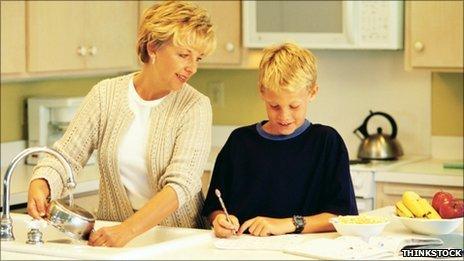Is Sweden the best place to be a woman?
- Published

Women in Sweden still do a majority of the housework and childcare
Is Sweden really one of the best places to be a woman? That is the view of many women outside Sweden, as well as some of us who live here. But is it a myth or a reality?
Let's face it, we are no longer topping the charts as we used to, when it comes to gender equality. Sweden has gone from the first position to fourth, according to the World Economic Forum's Gender Gap Index, external.
Nevertheless, we do stay in the top cluster with the other Nordic countries Iceland, Finland, and Norway.
However, Sweden still has a long way to go.
The latest edition of the report from Statistics Sweden, Women and Men in Sweden: Facts and figures, external, hints at various areas of concerns.
Both in education and in the labour market, the genders are not equally represented.
The number of female managing directors in listed companies is just eight out of 269.
Swedish women still earn on average 15% less than men. And one third of women still work part-time, some because they can't find full-time jobs and others because they have family responsibilities which hold them back.
Shall I go on?
In Sweden both men and women are entitled to 480 days of parental leave but the latest Daddy Index, published by the Swedish Confederation for Professional Employees (TCO), a trade union umbrella group, shows that men use only one fifth of their allowance.

Few Swedish men use up their paternity leave entitlement
The move towards both men and women taking equal parental leave is at a snail's pace.
Equal opportunity
I can hear the incredulous gasps from women around the world who are not entitled to such generous parental allowance systems. So, yes, I accept that compared to other parts of the world, the parental allowance system does make Sweden a good country in which to be a woman.
As does the government's decision, taken in 1972, to make equal opportunities between the sexes a central political issue.
The Danish sociology professor Gosta Esping-Anderson once wrote: "In Sweden, maximum female labour-force participation is a principle of social policy." I agree with that.
In Sweden, society makes it possible for each and everyone to earn his or her own living.
Well-built systems of child care and geriatric care, gender-neutral parental insurance, generous school opening hours and - not the least - individual taxation, have all contributed to this.
And yes, Sweden does have one of the highest employment rates in the world for women. But if you bring out the magnifying glass, you'll see that many women are working part-time in low-paid jobs.
According to a report from the TCO, among blue-collar workers, 50% of the women work part-time in often insecure employment conditions, compared with only 9% of men.
Their earnings are even further reduced when they decide to work less after having children.
This conflict between employment and childcare stops women from becoming economically independent, and reinforces the notion of men being the principal breadwinners.
There is an on-going discussion about how income differences between the sexes can be counterbalanced by equal opportunities at home.
Swedish women - like women around the world - are often still expected to play the lead role on the family stage. Two-thirds of housework is done by women.
So, how to make gender equality work at home?
The government is already providing some tax relief to households for using services for cleaning, laundry and gardening, but should it do more?
Should the government provide more child care?
Or should it allocate parental leave equally between the father and mother and force them to use it?
The debate on this issue is intense in Sweden.
Unfinished business
Gudrun Schyman, leader of the Feminist Initiative party, claims that there is a political unwillingness in Sweden to see this debate in a wider societal context.
She wants politicians to see this imbalance as a profound societal conflict, which is the result of the power structure that has to be fought and corrected, just like human rights' violations.
The feminist political philosopher Susan Moller Okin once said that a fair society is a society in which men and women participate in more or less equal numbers in every sphere of life.
I would say that equality between the sexes should be the benchmark by which a society is judged as a good or bad place.
And in that sense I suppose you could say that Sweden is a fairly good place to be a woman.
But more needs to be done. It's still an unfinished business.
- Published12 October 2010
- Published2 July 2010